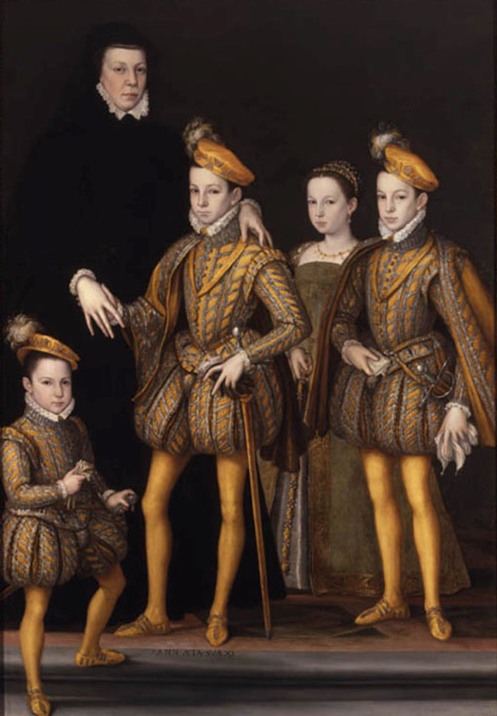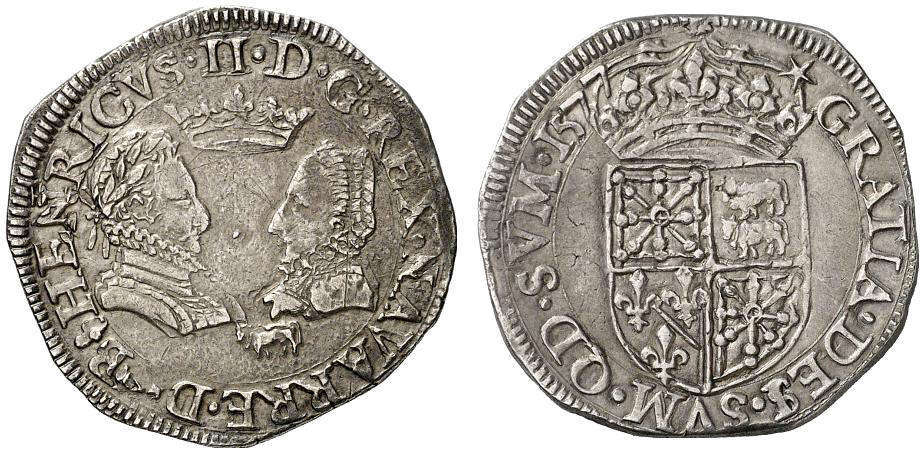
Kingdom of Navarre. Antoine de Bourbon and Jeanne II d'Albret. Teston 1566
The future king of France was born on December 13, 1553, as expected, in a royal family. But... in the royal family of Navarre. This small state in the Pyrenees was a remnant of a once rather large medieval kingdom - something that the Spaniards could not conquer. It is clear that the rulers of Navarre historically gravitated towards France - they had to look for protection from a powerful neighbor somewhere, which, in addition to Spain itself, ruled half the world - the Netherlands, Italy, the New World...
Navarre was inhabited mainly by Basques (Basques), or in French - Gascons. Everyone remembers D'Artagnan? The ruling dynasty of D'Albret is also more Gascon than French. Here, by the way, are the parents:

Kingdom of Navarre. Antoine de Bourbon and Jeanne II d'Albret. Teston 1566
In 1566, Henry's father Antoine,
who was the closest relative of the king of France, had already been lying in the grave for 4 years. But even during his life, he devoted little time to
and Navarre, and the child. There were reasons for that.
Antoine had a connection to Navarre only insofar as he was the husband of the only representative of the ruling house, now they would say the prince consort.
He rarely saw his son Henri, since he took part in numerous military conflicts, and no less numerous entertainments.
To put it mildly, his not very impeccable moral and religious principles did not earn him the respect of either the Huguenots or the Catholics, so although Antoine was formally the head of the House of Bourbon, his younger brother Louis Prince of Condé became a much more prominent historical figure. In general, the Bourbons were the next branch of the royal family and were considered heirs to the throne immediately after the ruling Valois dynasty. At the time when Henry II's three sons were alive, the chances of this inheritance seemed illusory...
On November 3, 1562, the two Bourbon brothers met at the siege of Rouen - Antoine as commander-in-chief of the royal army, Louis at the head of the Huguenots. Antoine was mortally wounded and the Prince of Condé became the head of the House of Bourbon.
Unlike her husband, Jeanne d'Albret was a convinced Calvinist, and raised her son accordingly. However, as we will see later, she did not succeed in this to the fullest extent. In her dominions, a repressive policy was carried out against Catholics.

Kingdom of Navarre. Jeanne II d'Albret. Teston 1565
Henri himself had already been at the French court for several years (since the accession of Charles IX - 1561), where he was raised together with the princes, the sons of Henry II - Henri and François. The first was 2 years older, the second a year younger.

Catherine de Medici with her children. From left to right - François, Charles, Marguerite, Henry
At court, Henry of Navarre converted to Catholicism for the first time.
In 1567, his mother insisted on his return to Navarre. Here he returned to the Calvinist faith.
Thanks to Jeanne, Navarre became a stronghold of the Huguenots, and, hoping to smooth over the contradictions between her subjects of different faiths, the Queen Mother Catherine de Medici decided to marry Henry to her daughter Margaret of Valois. Jeanne d'Albret was initially against it, but then agreed, hoping with the help of this union to achieve concessions in the attitude towards the Calvinists from the royal court.
However, she did not live to see the wedding for several months. It is not surprising that rumors began to circulate about poisoning and the participation of the Queen Mother in it.
And Henri, who was 19 years old at the time, became King Henry III of Navarre.
The wedding took place in 1572, followed by the St. Bartholomew's Day massacre. Henry survived, but it is not difficult to guess how these events affected him.
In 1574, at the age of 24, King Charles IX died. According to the famous Ambroise Paré, death was caused by pneumonia against the background of a tuberculosis infection, and not at all by a book poisoned by the queen mother, as Dumas told us. Charles did not have time to have children, and the fourth son of Henry II and Catherine de Medici, Henry III, became king.

Kingdom of France. Henry III. Teston 1575
The new king was not at alll resembles the melancholic slob described by Dumas. On the contrary, of all the sons of Catherine, Henry was the most developed, both physically and intellectually.
Henry of Navarre, meanwhile, still lived at court, but now as a prisoner. He was not prevented from enjoying court life, but he was not allowed to leave. He was too dangerous as a possible leader of the Huguenots, who, after the St. Bartholomew's Day massacre, realizing that there would be no peace, were actively preparing for war, gathering an army in the southwest of France, in Henry's possessions (and this was by no means only Navarre - the House of D'Albret owned Foix, Perigord, Armagnac, Dreux, Limoges, Bearn, etc.).
In 1576, he finally found himself in his kingdom, at the head of the Huguenot army. He may not have been so keen on it, but the Protestants needed their own king.

Kingdom of Navarre. Henry (III - as king of Navarre). Teston 1576
Queen Margot, naturally, remained in Paris. However, in 1578, the unloving spouses were reunited thanks to Catherine de Medici, who arrived with her daughter in Nérac. The guests stayed for a year and a half – apparently, this was a period of reconciliation between the warring parties.

Viscountcy of Bearn. Henry II (as Viscount of Bearn) and Margaret of Valois. Teston 1577
It should be noted that neither Henry nor Margaret ever bothered with their marriage union - both had a huge number of mistresses and lovers, respectively.
In 1583, Margaret quarreled with her brother Henry III and sought solace from her husband, but he was carried away by another mistress and in 1585 they quarreled forever.
In 1584, the last son of Henry II, Francois of Anjou, died. The king had no children, and it was unlikely that they would appear. Henry III was to become the last representative of the royal dynasty of Valois, and Henry of Navarre his legal heir. It was he who now
turned out to be the closest relative of the king.
Everything was turned upside down. The Protestants, who had previously gravitated toward the bourgeoisie, became ardent supporters of the hereditary monarchy. The monarchist Catholic League moved toward rapprochement with the Parisian bourgeoisie, who, however, did not like the alliance with the king - they did not consider him a consistent adherent of Catholicism. The king, for obvious reasons wanting peace with Henry of Navarre, was forced, under pressure from the Guises, to outlaw the Protestants and start a new war with them.
Nevertheless, in 1588, things came to an uprising, Henry III fled, and Paris was left without a king for the next six years.
In 1589, the Paris Parliament appointed Charles, Duke of Mayenne, lieutenant general of the state. Henry III, in the struggle for the crown, had no choice but to unite with his heir, whom he officially recognized as such in April 1589. In July, the allies besieged Paris. At the height of the siege, the king was killed by the fanatic Clement. On the same day, August 1, 1989, the Huguenots proclaimed their leader the new king, under the name of Henry IV. Another part of the army, consisting of Catholics, also recognized Henry of Bourbon as king, but on the condition that he accept Catholicism.

Kingdom of France. Henry IV. 1/2 franc 1590
Paris elected its king, Henry of Navarre's uncle, Cardinal Charles de Bourbon, under the name of Charles X.

Catholic League. Charles X. Double denier 1590
However, he soon died, and before his death he recognized Henry IV as the legitimate monarch. In French historiography, Charles X is considered to be the king who ruled in 1824-1830, and the cardinal was left with only the title of "pretender" or "king of the League".
The League had no time to deal with the election of a new king, and there was no one to choose from, so they decided to consider Henry III the king of France. The fact that he had died a year ago was not an obstacle, on the contrary - they had often quarreled before, but now the king agreed in advance with all decisions of the League's leadership :).

League. Henry III. 1/2 franc 1590
Meanwhile, the war continued. The main opponent of Henry of Navarre was the Duke of Mayenne, to whom Spain offered its help, under the slogan of protecting Catholicism, naturally. Probably, this reason also existed, but Spain had other interests in France - territorial (at least the same Navarre). Which of these reasons was more important is shown, for example, by the fact that at one time, "his Catholic Majesty" Philip II, without a shadow of a doubt, conducted military operations against the equally impeccable Catholic Henry III.

Spanish Netherlands. King of Spain Philip II. Philipstaler 1563
Henry was helped (though only with money) by England. Also, for the sake of supporting co-religionists, but there were also personal motives - the "eternal virgin" Elizabeth clearly sympathized with Henry.

Kingdom of England. Elizabeth I. Shilling undated
In the end, Henry realized that the only way out of this situation was to accept Catholicism. The problem
was not the king's religious beliefs, but the possible cooling of his Huguenot supporters. It was then that he allegedly said the famous phrase "Paris is worth a mass."
On July 25, 1593, the king attended a Catholic service in Saint-Denis, where his conversion was solemnly announced, and new supporters immediately began to flock to him. No one listened to the exhortations of the Duke of Mayenne. Cities surrendered one after another. Everything did not go as quickly as desired - the treaty with Mayenne was concluded only in 1595, peace with Spain in 1598, but now Henry was supported by almost the entire country. The war was summed up by the Edict of Nantes, signed by Henry IV in 1598.
It declared complete equality of Catholics and Huguenots. No state law had ever proclaimed such comprehensive religious tolerance before. The long-awaited peace had arrived.
In 1600, 47-year-old Henry IV married 27-year-old Florentine Maria de Medici, having finally divorced Queen Margot. This did not stop the king from continuing his numerous love affairs, but the following year the Dauphin, the future Louis XIII, was born.

Kingdom of France. Henry IV. 1/2 franc 1605
On May 14, 1610, the king was killed by the fanatical Catholic Ravaillac, thus repeating the fate of his predecessor Henry III.
Henry IV remained in the people's memory as "the good king Henry". He was even forgiven for the fact that he was not quite French - until the end of his life he spoke with a Gascon accent. The king really cared about his subjects. What is worth at least the phrase attributed to him - "I want every Frenchman to have chicken in his soup every day." Only for this, the French, not spoiled by such an attitude towards themselves, could love him forever :). And in general, he was, apparently, a charming person. Of course, over time, both the personality and the deeds of Henry IV became overgrown with legends, but legends don’t arise out of nowhere, right?
©2012